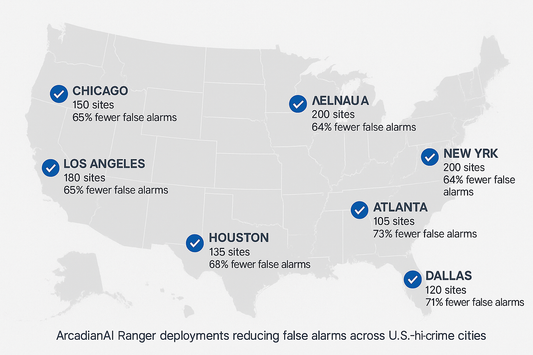FBI Cyber Division Issues Dire Warning: Remote Access Trojan (RAT) Exploiting Chinese-Brand DVRs — Businesses at Risk of Catastrophic Breaches
Got DVRs? Cybercriminals Are Already Knocking. Act Now.In September, the National Security Agency (NSA), in collaboration with the FBI, the U.S. Cyber Command’s Cyber National Mission Force (CNMF), and international allies, determined that cyber actors linked to the People’s Republic of China (PRC) have established a network of compromised nodes, known as...

Got DVRs? Cybercriminals Are Already Knocking. Act Now.
In September, the National Security Agency (NSA), in collaboration with the FBI, the U.S. Cyber Command’s Cyber National Mission Force (CNMF), and international allies, determined that cyber actors linked to the People’s Republic of China (PRC) have established a network of compromised nodes, known as a ‘botnet,’ intended for malicious activities. Using these botnets, the hackers compromised thousands of Internet-connected devices, including small office/home office (SOHO) routers, firewalls, network-attached storage (NAS), and IoT devices.
The Federal Bureau of Investigation (FBI)'s cyber division has issued a stark warning to businesses and organizations worldwide: a sophisticated Remote Access Trojan (RAT) known as HiatusRAT is exploiting vulnerabilities in Chinese-branded web cameras and DVRs. This malicious malware campaign underscores the growing cybersecurity threats targeting CCTV devices—leaving many companies exposed to potential data breaches and operational disruptions.
The HiatusRAT Threat: What You Need to Know
HiatusRAT is no ordinary malware. Since its emergence in July 2022, this Trojan has evolved into a highly versatile tool for cybercriminals, capable of remotely controlling devices, stealing data, and executing covert reconnaissance operations. Initially, the malware targeted outdated network devices, but its latest iteration reveals a broader scope of ambition.
In a March 2024 campaign, HiatusRAT expanded its reach, scanning IoT devices in countries including the United States, Canada, Australia, New Zealand, and the United Kingdom. Among its primary targets are web cameras and DVRs manufactured by popular Chinese brands Xiongmai and Hikvision.
What’s at Stake?
HiatusRAT’s capabilities extend far beyond simple device hijacking. Recent campaigns demonstrate its use for reconnaissance on critical U.S. infrastructure, including servers handling sensitive defense contract proposals. This highlights the potential for wide-scale disruption, not just to private businesses but also to national security.
How It Works
Attackers are exploiting critical vulnerabilities with frightening precision, tearing through defenses like they don’t even exist. Key vulnerabilities exploited include:
- CVE-2017-7921
- CVE-2018-9995
- CVE-2020-25078
- CVE-2021-33044
- CVE-2021-36260
Armed with tools like Ingram, a publicly available webcam-scanning tool found on GitHub, and Medusa, a brute-force password-cracking weapon, these attackers relentlessly target devices. Outdated firmware and weak, default passwords aren’t just security oversights—they’re an open door, allowing hackers to walk into your systems unchallenged.
Once they’re inside, HiatusRAT becomes a predator in your network, silently taking control of your devices. This malware doesn’t just steal sensitive data—it gains a foothold in your infrastructure, turning your systems into a launchpad for further attacks. Your network, your operations, and your data become their playground, and the longer the breach goes unnoticed, the more devastating the consequences.
Why This Matters: The Danger Lurking in Plain Sight
IoT devices like web cameras and DVRs are the silent weak links in cybersecurity—often overlooked but vital to safeguarding both physical and digital spaces. When compromised, these devices become cybercriminal playgrounds, exposing sensitive data and providing attackers with a backdoor to infiltrate and compromise your entire network.
HiatusRAT preys on this complacency. Its ability to exploit vulnerabilities in widely-used Chinese-brand devices like Xiongmai and Hikvision is a chilling reminder of how exposed businesses truly are. These devices, deployed in thousands of organizations globally, are more than just tools—they are unprotected entry points for cyberattacks that can spiral out of control.
This isn’t just a “risk” or a “possibility”—it’s a clear and present danger. The FBI has sounded the alarm: cybercriminals are already exploiting these vulnerabilities with ruthless efficiency. Failing to act now doesn’t just put your data at risk—it puts your entire business and reputation on the line.
Take Action Now
The FBI strongly urges all businesses and organizations of all sizes to act immediately. If you detect signs of compromise or notice any unusual device activity, report it without delay to your local FBI field office or the FBI Internet Crime Complaint Center (IC3.gov).
The HiatusRAT campaign is a critical wake-up call for businesses utilizing Chinese-branded security devices. Cybercriminals are exploiting known vulnerabilities, and without proactive measures, your systems and sensitive data are at risk. Addressing this threat demands robust security measures and trusted platforms designed to counter these sophisticated attacks.
At ArcadianAI, we don’t just prioritize security—we redefine it. Powered by the Amazon AWS Cloud, trusted by U.S. defense and government agencies, our platform employs industry-leading protocols such as AES-256 encryption and the latest TLS standards, delivering complete end-to-end protection for your data—in transit, within networks, and securely stored in the cloud.
Even if your systems rely on vulnerable Chinese-branded DVRs or legacy devices, ArcadianAI integrates seamlessly, fortifying your infrastructure against exploitation. With 100% guaranteed protection, advanced threat detection, and continuous monitoring, we actively defend your business against the most sophisticated and evolving cyber threats.
Our platform doesn’t just protect—it future-proofs. We deliver robust defenses for compliance-critical industries and scalable solutions that adapt to your growing needs. With ArcadianAI, your business stays resilient, your data remains uncompromised, and your reputation is safeguarded. 🛡 See Demo Today.
Source - https://www.ic3.gov/CSA/2024/241216.pdf
This is no time for complacency. Take the necessary steps to secure your systems, safeguard your critical data, and fortify your organization against evolving cyber threats.

Security is like insurance—until you need it, you don’t think about it.
But when something goes wrong? Break-ins, theft, liability claims—suddenly, it’s all you think about.
ArcadianAI upgrades your security to the AI era—no new hardware, no sky-high costs, just smart protection that works.
→ Stop security incidents before they happen
→ Cut security costs without cutting corners
→ Run your business without the worry
Because the best security isn’t reactive—it’s proactive.






